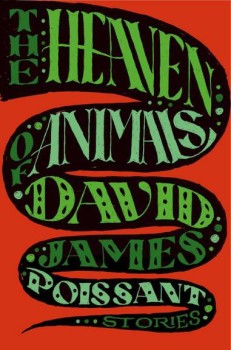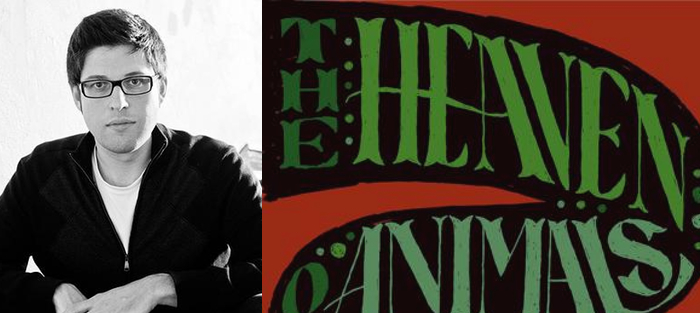One early Sunday morning last August found me tiptoeing barefoot down the driveway to retrieve the Chicago Tribune’s Printers Row literary supplement. You can read Printers Row online, but I like to get the hard copy, and go through the old newspaper ritual with the literary news, coffee and breakfast at the elbow as I read. Printers Row comes with a weekly short story or novel excerpt, printed on multipurpose paper rather than newsprint, and bound separately. I usually set it aside for bedtime reading during the week.
On this particular morning, I flipped open the short story, “The End of Aaron,” but, instead of setting it aside, I kept reading as I walked slowly into the living room with my coffee, and sat down. The story is told from a young woman’s point of view about a longtime boyfriend with a serious mental illness who routinely goes on and off his meds. The voice felt authentic, the story full of careful twists and turns, suffuse with love, anger, frustration, empathy. And honey. And bees. The characters and their lives felt so fully realized that I was sure I was reading a novel excerpt. I sought out David James Poissant online in order to send him a note of appreciation for “The End of Aaron.” Poissant, a creative writing professor at the University of Central Florida, wrote me back promptly, full of thanks and the invitation to call him Jamie. It turned out that “The End of Aaron” was a short story, and the collection of which it is part, The Heaven of Animals, was to be published in spring 2014.
I received an advanced copy of the collection following my exchange with Jamie, and the stories filtered into my dreams. There were the bees, alligators and snakes, cars careening off snowy bridges into icy waters. There were awkward, misunderstood children, some quiet, some brassy, some sage. The imagery and characters from these stories haunt me still.
Jamie and I conducted this interview via email over the course of our respective semester breaks. What I love about the story of Jamie’s fiction writing career is the deep commitment, sacrifice, and careful strategizing between him and his wife, Marla, to make both his writing and their family life happen. We should all be so lucky.
Interview
Jennifer Solheim: Before we get to The Heaven of Animals, let’s start with the genesis: When did you begin writing?
David James Poissant: I didn’t always know I’d be a fiction writer. I wanted to be a visual artist. Then a poet. But, ultimately, I fell in love with short stories, and you can only read so many stories before you feel led to try your hand at one of your own. I wrote a story as an undergrad in college, and I knew enough to know that it wasn’t very good. So, I read. For the next few years, I read everything I could get my hands on. Two years out of college, I spent a summer taking a stab at a novel, but the form was too big, too unwieldy, and I gave up. I turned to stories, and, over the course of the next two years, I wrote probably a dozen stories, few of which were good, but all of which allowed me the chance to experiment with plot, character, point of view: the basics.
Finally, I got serious enough about writing that I was ready to dismantle my life and start over. My wife, Marla, and I owned a house. She taught elementary school, and I taught high school English. We had jobs in the same district just minutes from our house. We’d made a life for ourselves. We were in great financial shape. Then I had to go and decide to become a writer.
But Marla was amazingly supportive. She encouraged me to apply to MFA programs. I got into the University of Arizona, and so we sold our house, quit our jobs, packed up our things, and moved to Tucson for two years.
When did you begin to write the stories in The Heaven of Animals? When did they begin to take shape as a collection?
I wrote the earliest story from the collection, “How to Help Your Husband Die,” in 2004, but I didn’t send it out for a while. I thought of it as an experiment in second person and didn’t trust that it was good enough to be out in the world. About six years later, I pulled it out, revised it for tone and consistency of voice, and sent it out. Ultimately, the Notre Dame Review published it in 2011.
During my two years in Tucson, I wrote “Lizard Man,” “Me and James Dean,” “Knockout,” “Venn Diagram,” “The Disappearing Boy,” and a very different version of the title story. The other nine stories were written in the four years of my PhD program at the University of Cincinnati and during my first year teaching in the MFA program at the University of Central Florida.
So, I guess it took me eight years to put the collection together, but it would be misleading for me to suggest that I knew what I was doing at the time. I was just writing. For the sixteen stories that wound up in the book, I published another twenty stories in magazines and journals, and I wrote a few dozen other stories that, deservedly, will never see the light of day. When I felt that I had enough strong stories, my agent sent a group of them around to editors. The editor who took the collection—the genius, genius (I really can’t say enough good things about her) editor Millicent Bennett at Simon & Schuster—read all of my stories and helped me to pick the best ones from the pile. Then we spent a few weeks arranging the order, and suddenly we had a book.
But, no, I never really knew what I was doing in terms of “shape” along the way. The only thing that I knew I wanted (and one of the few things that didn’t change as the collection morphed and mutated) was to begin the book with “Lizard Man” and end it with “The Heaven of Animals.” Something about those stories as bookends felt right to me, and, thankfully, that felt right to my agent and my editor as well.
 The settings and plot details of these stories are very much contemporary and American, but you also make use of classical literary forms and figures with an admirably light touch. Your stories are fabulist, too: animals play a significant role, both as characters and as a theme. So: from where do you draw your influences? How do you come up with ideas for stories?
The settings and plot details of these stories are very much contemporary and American, but you also make use of classical literary forms and figures with an admirably light touch. Your stories are fabulist, too: animals play a significant role, both as characters and as a theme. So: from where do you draw your influences? How do you come up with ideas for stories?
I guess I’m lucky in that I’m never at a loss for ideas. There are days I don’t want to write, and there are definitely weeks when I’m not writing well. But I always have ideas for new stories and novels, realist and fabulist. They come to me faster than I can get them written down. I have boxes of journals, notepads, index cards, even napkins, where I’ve scribbled down some idea for a story, most of which I’ll never use.
As for influences, Carver was a big influence early on. I love the voices he gives his characters, especially in later stories like “Cathedral” and “Call If You Need Me.” I love Frederick Barthelme’s sense of place. I love Charles D’Ambrosio’s pacing and the long stories of The Dead Fish Museum. I love Lorrie Moore’s dark sense of humor. But there are so many writers that I admire deeply: Amy Hempel, Antonya Nelson, Bret Anthony Johnston, Karen Russell, Ron Rash, Ron Carlson. It’s hard for me to know which have influenced me. To the degree that any of these writers have rubbed off on me, I feel lucky.
Relationships between parents and children are a significant theme as well. When did you begin to write about these relationships? Do you find that becoming a father changed the way you write about parents and children?
I’ve always been interested in family and the idea of family and the families we make for ourselves. Family is composed of the people you love most. Therefore, they’re the people most likely to hurt you. I’m interested, then, in how we hurt each other, often without meaning to, just by what we want.
In “Lizard Man,” Jack doesn’t want to hurt his father. But isn’t it fascinating and sad that a father can take it personally that his son is gay? These things still happen, even in the twenty-first century, families torn apart by sexuality or religion or politics. I see it all the time. I don’t know that writing about it will change it or make anything better, but it’s certainly a way for me to explore such situations and to try to exercise a little empathy. I could have written that story from Jack’s point of view, but writing from Dan’s and trying to remain sympathetic to his viewpoint was the much harder route. As soon as I knew that it would be, I knew that was the story I needed to write.
You have both an MFA and a PhD, and now you’re an assistant professor in an MFA program. Why did you choose to pursue a PhD after the MFA? How did the doctorate nourish your writing? Did the coursework in literature change your creative practices or writing style in any way? Are you continuing with critical work, or are you wholly focused on fiction writing now?
Truthfully, the PhD started as a way for me to put off the real world and an abysmal job market for another four years. Coming out of Arizona, I didn’t have enough publications for a good job—a job that would allow me any time to write—so I applied to fellowship and PhD programs. I’d met a number of great writers at the Sewanee Writers’ Conference with connections to the University of Cincinnati, and the school seemed like a good fit.
Looking back, there were things I didn’t like about doing a PhD. The coursework was intense and left me less time to write than I would have liked. If you look at my CV, there’s a two-year hole during which I only published one or two stories. But, I got to read a lot (my exams required the reading of 180 books!) which I didn’t mind, and I was fortunate enough to be given a fully funded dissertation year by the Charles Phelps Taft Research Center, which allowed me to revise my collection and begin a novel.
What the PhD gave me was exceptional teaching experience. Had I not done the PhD, I would not have the job I have today. It also gave me Brock Clarke, Michael Griffith, and Leah Stewart, three amazing writers and professors, now friends, who gave me valuable insight and feedback on my work. My peers in the PhD program also became friends for life. We still show each other work and help one another however we can.
A practical question: where are you right now as you respond to my interview questions? Could you describe your surroundings a bit, who you’re with, or if you’re alone, who’s got the kids?
Ha! As I type this, it’s 11:50 at night. I began answering the questions about an hour ago. My wife and kids are all in bed. I’m seated at the kitchen table because I got hungry, and I’ve been devouring Rold Gold brand stick pretzels while I work on my laptop. Most of my fiction writing is done in the mornings in my school office or at a coffeehouse. I can’t write at home. Too many distractions: Marla, my twin four-year-old daughters, our dog. Okay, so they’re not distractions. I adore them. I just can’t get work done at home when they’re awake.
Yes, you make it clear that Marla is a huge source of support for you! Does she do her own creative work?
Marla isn’t a writer, but she’s my first reader. And she’s my best reader. If she loves a story, I know I’ve done something right. If she doesn’t, I know I’ve messed up somewhere. She’s also really, really good at catching story inconsistencies and things that made sense in my head but don’t make sense on the page. She’s been with me from the beginning, and she’s been the biggest source of inspiration for me along the way.
What are you working on right now?
My contract with Simon & Schuster was a two-book deal for the collection and a novel. At the time, I’d finished the first hundred-page chunk of the novel. Currently, I have several hundred pages on my hands. I’m whipping them into shape and hoping to be done with the first draft very soon. I’ll show it to Marla, then to my editor and a few trusted writer friends.
Originally, the novel was something I started just to sell the collection. I didn’t feel very invested in it. But, a few chapters in, I hooked myself, and now I’m in deep. I’ve been living with these characters for three full years now, and I find myself thinking about them all the time.
Actually, two of the novel’s characters are Richard and Lisa Starling from “The Geometry of Despair.” The novel picks up about thirty-five years from where “Wake the Baby” leaves off. Michael is grown and has a younger brother, Thad. They’ve all gathered at the family’s North Carolina lake house a week before it’s going to be sold. And trouble ensues the way trouble always ensues when you put family together in a house on a lake for a week. There’s some ornithology, an art gallery, sex, a little recreational drug use, some light mathematical physics, and, of course, lots of family dynamics.
That sounds like quite a party! On a final note for readers, any advice on sophomore projects and how you plan to address reading your own reviews?
Well, the reviews have already started coming in, and, so far, they’ve been incredibly generous. I don’t know how I’ll feel about bad reviews. I’m sure there will be some. I can’t pretend that I won’t read every review. Hopefully, I’ll be able to let the bad ones roll off my back, but they might hurt.
Writing a novel feels so different from putting together a collection that I think the sophomore effect won’t hit me until I face whatever my third book will be. Does that make sense? Because the novel form is such a remove from the short story form, I feel like I’m writing a second first book.






